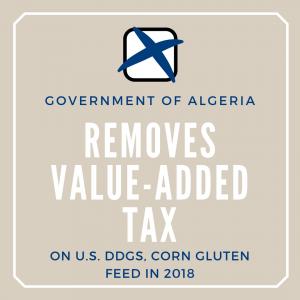The government of Algeria has lifted a value-added tax (VAT) on U.S. distiller’s dried grains with solubles (DDGS) and corn gluten feed (CGF) for 2018, affording new opportunities this marketing year.
“The U.S. Grains Council (USGC) has been demonstrating the clear advantages of using DDGS and CGF in feed rations through activities in Algeria,” said Ramy Hadj Taieb, USGC regional director for the Middle East and North Africa. “This success was made possible thanks to efforts deployed by the Council and our various partners in Algeria.”
Algeria is the second largest corn market in North Africa, second only to Egypt. The poultry and dairy sectors are growing industries where U.S. co-products fit well into rations. However, a complex environment and government influence on the economy complicates market development efforts.
For the last two years, the Algerian government has imposed regulations and made decisions to restrict imports in order to offset the persistent drop in international oil and gas prices. That included a 17 percent VAT on both U.S. DDGS and CGF. Combined with existing import duties of 30 percent, imports of these products were simply uncompetitive with other feed ingredients.
However, thanks to work by the Council and partners in country to push for a reduction in tariffs, the Algerian government released a list of feed ingredients benefiting from an exoneration of a value-added tax until Dec. 31, 2018. The list notably includes corn, barley, DDGS and CGF, a particular success in this economical context.
“The difference of cumulated import and value-added tax tariffs has considerably narrowed, especially when compared to competing feed ingredients,” Taieb said. “This situation offers new and interesting import perspectives for U.S. co-products in Algeria as the Council continues to promote the value of U.S. DDGS and CGF in improving feed conversion rates.”
While the exemption from the value-added tax is a success, U.S. DDGS and CGF are still subject to import duties of 30 percent, compared to 5 percent for both corn and soybean meal. As a result, the Council will continue efforts to bring these import duties in line with other feed ingredients as well as to demonstrate the value of utilizing U.S. DDGS and CGF in poultry and dairy feed rations to Algerian producers.
Learn more about the Council’s work in North Africa here.


